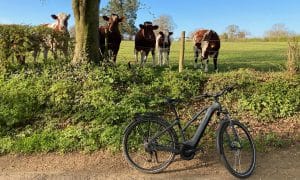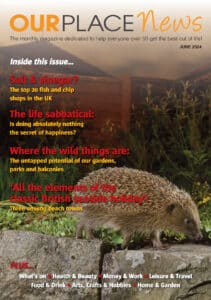Following the Somerset Food Trail by e-bike offers the chance to meet growers and makers, enjoy beautiful scenery, and sample delicious local produce.

What more do you need than good cheese and a glass of cider?” I’m at Batch Farm, in the Somerset village of East Pennard, and cheesemaker Malcolm Dyer is genially setting out his stall.
The farm is one of the highlights of the Somerset Food Trail, a 10-day celebration of the county’s smaller-scale food producers running until 24 July. The trail aims to highlight the area’s bounty, offering visitors the chance to explore farms, meet growers, picnic in community farms and “food forests”, sip cider while watching local bands, and generally guzzle, graze and shop to their stomach’s content.
Somerset is a surprisingly extensive county, so the trail’s organisers have helpfully sliced it into 11 areas. Setting out to get a taste of the terrain in advance, I decide to focus on the patch I know best – Bruton, Castle Cary and Wincanton – but to explore it anew on one of Bruton Bike Hire’s guided electric cycle safaris. Ten of these tours will be running during the event, along two different routes, and I’m trialling the northern loop.
I meet my guide, Robin Balme, on Bruton’s High Street. This tiny town has punched its way into heavyweight food circles over recent years with the opening of At the Chapel, Roth Bar & Grill, Matt’s Kitchen and Osip. Propping them up, however, is a thriving farm-to table scene and- once Balme has set me up with a bike, helmet and hi-vis vest – the aim is to delve into it, fork-first.
Pedalling north out of town, we start with a climb – first up Coombe Hill , then up tunnel-like Snakelake Hill. As we go, we’re hit by wafts of late wild garlic, the flowers warmed by shards of sunlight. We stop at the top, on Crow’s Hill. Not to catch our breath; we’re on Bosch-engined Cube electric bikes and, as we navigated the steep rise, Balme had tactfully suggested that I might want to hit turbo (I did). It’s more that the view is too good to zip past: it soars down over hedgerows and dimpled fields into Batcombe Vale.
From here we cycle down and up again to Westcombe, at one point squeezing between a shiny red van and a cottage so garlanded with roses I wonder if we have stumbled into a Postman Pat TV set. But while Somerset sometimes feels otherworldly in its pastoral prettiness, its food producers, as in so many agricultural communities, are facing very real challenges linked to climate, biodiversity loss, supply chains and the cost of living. Against this backdrop, events like the Somerset Food Trail aren’t just a delicious way to spend a weekend but also a vital means of connecting consumers with local growers and producers.
One of the latter is Westcombe Dairy’s Tom Calver. As he shows me around the dairy’s hi-tech cheese cellar, he tells me he’s been looking increasingly at biodiversity in a holistic way, making connections between the microbiome of the soil all the way up the food chain to people eating his cheese.
Westcombe is best known for its traditional farmhouse cheddar, though it produces eight types of cheese, and has also branched out into charcuterie and has a hand in Landrace Bakery, in nearby Bath, the next stage of which includes setting up a flour mill at the farm. With The Wild Beer Company and Brickell’s Ice Cream also based in the dairy’s outbuildings, there is plenty of scope for experimentation and collaboration; Brickell’s makes a stracciatella flavour using Westcombe’s ricotta, for example. “We’ve also started experimenting with agro-forestry,” says Calver. “Switching from an intensive farming system to paddock farming meant we needed to create shade for the cows, so we planted fruit trees and shrubs, choosing berries in the hope that Rob, at Brickell’s, can use them in his ice-creams.”
Full of the joys of regenerative farming – and bites of Tom’s addictively tangy cheddar – we cycle on, freewheeling past ancient orchards and enjoying the smell of sun-baked hay. Dipping down into East Pennard village, we roll up at Batch Farm. Owner Jean Turner’s mother started making cheese here in 1963, and Turner is still turning 27kg cheeses herself at 69. Walking through the cheese cave, surrounded by rows of mould-marbled, cloth-bound cheddars, I get a distinct earthy whiff of maturing cheese, and an understanding of the care that goes into the process. After the tour, Malcolm Dyer hands me a hunk of 16-month-old traditional mature cheddar, rich and nutty. I nod my head in appreciation, and Turner approves (it’s her favourite).
In a previous life, Balme worked as an electrical engineer at Glastonbury, and we gossip about the festival as we pedal on along the old Roman Fosse Way to Wraxall Vineyard, established in 1974. The owners, Lexa Hunt and David Bailey (not that one), bought it 18 months ago, transforming it from a sleepy English vineyard into something that wouldn’t look out of place in Napa. Beyond the vines themselves (which the couple are overhauling with the help of expert viticulturists), plans include cellar door sales, workshops, tours, parties and vineyard stays. The centrepiece is a striking glass-walled event space with an extraordinary view over a vine-covered hillside to what looks like the Somerset Levels but is, in fact, the misty northern reaches of Dorset.
“The archaeologist at The Newt [a nearby garden and hotel that’s opening a reconstructed Roman villa this summer] is an expert on English vineyards planted by the Romans and he believes this was on of those,” says Hunt. It’s not hard to conjure a bacchanalian vision from 2,000-odd years ago as we taste a trio of wines – a sparkling white, a raspberry-nosed pinot noir rosé and a fruity bacchus.
On the bike tours, hungry cyclists will stop here for a wine tasting and Somerset Lunch – a banquet including sausage rolls, charcuterie, salads from Pinsents deli in Castle Cary and White Lake goat’s cheese.
Today, though, we’re pedalling on for glasses of Harry’s Corker cider at nearby Alhampton Inn and what Balme calls his “emergency ploughman’s” – a feast of Westcombe cheddar, homemade bread and pickles stashed in his pannier that Batch Farm’s Malcolm Dyer would surely approve of.
From here it’s a gentle 20-minute cycle back to Bruton and the end of my magic buffet ride. Or, nearly. The next day I return on my own to visit a few more producers. In Galhampton I meet grower Tia Cusden at Wild Garden, a bucolic organic market garden where trail visitors can picnic by the pond and nose around a neat patchwork of leafy greens and edible flowers.
Then there’s the Somerset Spirit Company, outside Castle Cary, where entrepreneur Anthony Gaster’s milk vodka, milk gin and “wheysky” are made using waste whey from Wyke Farms and sells out almost as quickly as he can make it (he is currently working on a cheese-cave-aged version of the wheysky).
My final stop is at Chapel Cross Tea Room in South Cadbury. Run by Rose Adams, it comprises a pocket-size arts venue, a circus-style outdoor café and a small herd of Golden Guernsey goats. Last winter, Adams built her one-woman dairy from scratch, milking the goats just once a day, in a horsebox milking parlour, so that the kids can stay with their mothers. The resulting two cheeses (a nutty semi-hard and a gorgeously gooey soft) are delicious.
As I make my way home, I spot a sign on the A303 stating ‘You are seven fields from Teals’. A glossy farm shop and café, Teals is like a more intimate, more West Country version of Gloucester Services, its fridges and shelves full of local produce. Forget food miles, I think. Field miles feels a much better unit of measurement for Somerset.
The Somerset Food Trail runs from 15 to 24 July. Guided e-bike Food Trail safaris cost £100pp, all inclusive, or from £30 a half-day for e-bike hire alone. Operators in other regions of Somerset are also running bike tours during the trail.
(Article source: The Guardian)

